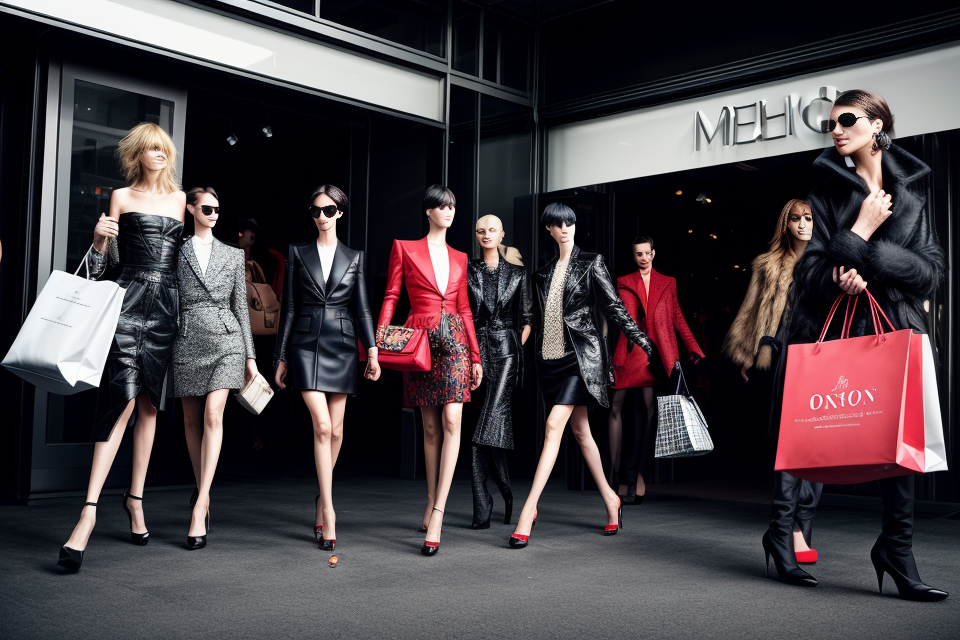
Fashion is not just about clothes, it’s a form of self-expression, a way to showcase one’s personality and social status. People buy fashion brands not just for their quality, but also for the emotional value they attach to them. In this article, we will explore the psychology behind why people buy fashion brands, delving into the factors that influence consumer behavior, such as social status, brand image, and the perceived value of luxury. We will also examine the role of fashion in shaping individual identity and how it can impact our decision-making process. So, let’s dive into the world of fashion and discover the hidden motivations behind our shopping habits.
People buy fashion brands for a variety of reasons, including to express their personal style, to convey social status, and to signal belonging to a particular group or subculture. The psychology behind consumer behavior is complex and can be influenced by factors such as cultural norms, social media, and advertising. People may also be influenced by the perceived quality and durability of a brand, as well as its perceived value for money. Additionally, fashion brands often create a sense of exclusivity and desirability, which can drive consumer behavior. Ultimately, people’s choices when it comes to fashion brands are influenced by a combination of practical considerations and emotional factors.
Factors influencing consumer behavior
H3 – Personal values and beliefs
Individuals may buy fashion brands that align with their personal values and beliefs, such as sustainability or ethical production. This section will explore how personal values and beliefs influence consumer behavior in the fashion industry.
- Sustainability
- Environmental concerns: As consumers become more aware of the environmental impact of fast fashion, they may choose brands that prioritize sustainable practices, such as using eco-friendly materials or reducing waste.
- Social responsibility: Consumers may also seek out brands that have a positive social impact, such as supporting fair labor practices or donating a portion of profits to charity.
- Ethical production
- Fair labor practices: Consumers may be drawn to brands that prioritize ethical production, such as paying workers a living wage and providing safe working conditions.
- Transparency: Brands that are transparent about their supply chain and production processes may also appeal to consumers who value ethical production.
By aligning with personal values and beliefs, consumers can feel a sense of alignment with the brand and may be more likely to make a purchase. Additionally, consumers may also use fashion brands as a way to signal their values to others, such as by wearing a brand that supports a cause they care about.
H3 – Social influence
The role of social groups in fashion consumption
People often buy fashion brands to fit in with a particular social group or to make a statement about their social status. Social groups play a significant role in shaping consumer behavior, as individuals strive to maintain or enhance their social standing within their peer groups. Fashion brands serve as visual cues that signal an individual’s social identity and group affiliation. Consequently, consumers may choose specific brands or styles to align themselves with a particular social group or to differentiate themselves from others.
Symbolic meanings of fashion brands
Fashion brands carry symbolic meanings that are often rooted in cultural and social contexts. Brands may be associated with particular values, beliefs, or lifestyles, and consumers may choose to align themselves with these meanings to express their own identity or to distance themselves from negative associations. For example, a consumer may choose to wear a luxury brand to signal their wealth or success, while another consumer may choose to wear a counterculture brand to express their rebellion against mainstream norms.
The impact of social media on fashion consumption
Social media has significantly impacted the way consumers perceive and engage with fashion brands. Platforms such as Instagram and TikTok have transformed fashion consumption into a highly social and interactive experience, with users sharing their outfits, fashion trends, and brand preferences with their followers. This creates a sense of community and shared experience among fashion consumers, and can influence their purchasing decisions through social proof and peer validation. Brands have also leveraged social media to create influencer marketing campaigns and sponsored content, further amplifying the influence of social media on fashion consumption.
Overall, social influence plays a significant role in shaping consumer behavior towards fashion brands. Consumers are often driven by the desire to fit in with a particular social group or to express their identity through their fashion choices. Brands that are able to tap into these social dynamics and create meaningful connections with their target audience are likely to gain a competitive advantage in the highly competitive fashion industry.
H3 – Marketing and advertising
The impact of marketing and advertising on consumer behavior
Marketing and advertising play a significant role in shaping consumer behavior and influencing purchasing decisions. Brands invest heavily in marketing campaigns to create a desirable image and generate interest in their products. By utilizing various marketing techniques, brands can create a sense of desire and exclusivity around their products, leading to increased sales.
Creating a unique brand identity
Marketing and advertising campaigns help brands establish a unique identity in the market. By emphasizing their brand values, visual identity, and messaging, brands can differentiate themselves from competitors and appeal to specific consumer segments. This helps to build brand loyalty and encourages repeat purchases.
Emotional appeal
Marketing and advertising campaigns often leverage emotional appeal to create a connection with consumers. By evoking emotions such as desire, aspiration, or nostalgia, brands can create a memorable and engaging experience for consumers. This emotional connection can influence consumers’ perception of the brand and make them more likely to purchase from the brand in the future.
Celebrity endorsements
Celebrity endorsements are a common marketing tactic used by fashion brands to increase their appeal to consumers. By associating their products with a celebrity, brands can create a desirable image for the brand and increase its appeal to consumers. Celebrities endorsing fashion brands can influence consumers’ perception of the brand and make it more aspirational. However, it is important for brands to carefully select celebrities that align with their brand values and appeal to their target audience.
Psychological factors
H3 – Self-esteem
When it comes to buying fashion brands, one of the main psychological factors that drive consumer behavior is the desire to boost self-esteem. Consumers often use fashion brands as a way to feel more confident and improve their overall sense of self.
H4 – Social Status
One of the key reasons why people buy fashion brands is to project a certain social status. Consumers may associate certain brands with success, wealth, or exclusivity, and therefore feel more confident and valued when they wear those brands. For example, a consumer who buys a designer handbag may feel more sophisticated and successful than someone who buys a generic handbag.
H4 – Individuality
Another reason why people buy fashion brands is to express their individuality and stand out from the crowd. Consumers may choose brands that reflect their unique style or personality, and feel more confident and comfortable when they wear those brands. For example, a consumer who buys vintage clothing may feel more creative and distinctive than someone who buys mass-produced clothing.
H4 – Identity
Fashion brands can also play a role in creating a more cohesive sense of identity. Consumers may choose brands that align with their values, beliefs, or lifestyle, and feel more confident and authentic when they wear those brands. For example, a consumer who buys eco-friendly clothing may feel more environmentally conscious and responsible than someone who buys fast fashion.
Overall, the desire to boost self-esteem is a powerful motivator for many consumers when it comes to buying fashion brands. Whether it’s projecting a certain social status, expressing individuality, or creating a more cohesive sense of identity, fashion brands can play an important role in enhancing self-esteem and improving overall confidence.
H3 – Emotional attachment
When it comes to fashion brands, consumers often develop emotional attachments to them for a variety of reasons. These attachments can be formed for a number of different reasons, including personal connections to the brand, positive associations with a particular memory or event, or even because of the brand’s reputation.
Personal connections
One of the most common reasons why consumers develop emotional attachments to fashion brands is because they have a personal connection to the brand. This could be because they have been loyal customers for a long time, or because they have had positive experiences with the brand in the past. For example, a consumer might have bought their first designer handbag from a particular brand and have a strong emotional attachment to that brand ever since.
Positive associations
Another reason why consumers might develop emotional attachments to fashion brands is because of positive associations they have with the brand. This could be because the brand is associated with a particular memory or event, such as a special occasion or a vacation. For example, a consumer might associate a particular fashion brand with their honeymoon, and therefore feel emotionally attached to that brand because of the positive memories associated with it.
Reputation
Finally, consumers might develop emotional attachments to fashion brands because of the brand’s reputation. This could be because the brand is seen as being associated with success, or because it has a positive reputation in the fashion industry. For example, a consumer might feel emotionally attached to a particular fashion brand because they believe that the brand is associated with high-quality, luxury fashion.
Overall, emotional attachments to fashion brands can be formed for a variety of reasons, including personal connections, positive associations, and reputation. These attachments can lead to brand loyalty, where consumers continue to buy from the same brand even if there are cheaper alternatives available.
H3 – Status and power
- Consumers may buy fashion brands as a way to display their wealth and status, or to feel more powerful and successful.
- Brand status and exclusivity: Some consumers may choose to buy fashion brands that are considered high-status or exclusive, as a way to signal their own wealth and success to others. This can be especially true for luxury brands, which are often associated with prestige and exclusivity.
- Social comparison: Another factor that can drive the purchase of fashion brands is the desire to compare oneself to others. Consumers may choose to buy brands that are popular or fashionable among their peers, as a way to fit in and be accepted by their social group.
- Self-esteem: For some consumers, buying fashion brands can be a way to boost their own self-esteem and confidence. By purchasing items from well-known or prestigious brands, consumers may feel more powerful and successful, and may also receive positive feedback from others.
- Materialism: Consumers who place a high value on material possessions may be more likely to buy fashion brands as a way to display their wealth and status. This can be especially true for consumers who live in societies that place a high value on material success and consumption.
FAQs
1. Why do people buy fashion brands?
People buy fashion brands for a variety of reasons. One reason is to make a statement about their personal style and to express their individuality. Another reason is to fit in with a particular social group or to project a certain image. Additionally, some people may buy fashion brands as a way to signal their status or to show off their wealth.
2. What role does psychology play in consumer behavior when it comes to fashion brands?
Psychology plays a significant role in consumer behavior when it comes to fashion brands. People’s emotions, beliefs, and attitudes can influence their perceptions of different brands and their willingness to purchase them. For example, people may be more likely to buy a fashion brand if they feel a connection to the brand’s values or if they believe that the brand reflects their personal style.
3. How do fashion brands create emotional connections with consumers?
Fashion brands create emotional connections with consumers through various marketing strategies, such as using celebrities or influencers to promote their products, creating a strong brand identity, and appealing to consumers’ values or beliefs. Brands may also use nostalgia or emotional triggers to create a connection with consumers and make them feel more attached to the brand.
4. How do consumers make decisions about which fashion brands to buy?
Consumers make decisions about which fashion brands to buy based on a variety of factors, including the brand’s reputation, the quality of the product, the price, and the perceived value of the brand. Consumers may also consider the opinions of others, such as friends, family, or social media influencers, when making their decision. Additionally, consumers may be influenced by their own personal values and beliefs, as well as by the marketing and advertising efforts of the brand.
5. How has the rise of fast fashion affected consumer behavior when it comes to fashion brands?
The rise of fast fashion has had a significant impact on consumer behavior when it comes to fashion brands. Fast fashion brands offer trendy, affordable clothing, which has made it easier for consumers to buy more fashion products and to buy them more frequently. This has led to a shift in consumer behavior, with many people now buying more fashion items from fast fashion brands and less from traditional, higher-end fashion brands.
6. How do cultural and social factors influence consumer behavior when it comes to fashion brands?
Cultural and social factors can have a significant impact on consumer behavior when it comes to fashion brands. For example, consumers in different cultures may have different preferences for certain fashion brands or styles, and social groups may have their own fashion trends and preferences. Additionally, cultural and social factors can influence consumers’ perceptions of different fashion brands and their willingness to purchase them. For example, a fashion brand that is seen as being aligned with a particular cultural or social group may be more appealing to consumers who identify with that group.

